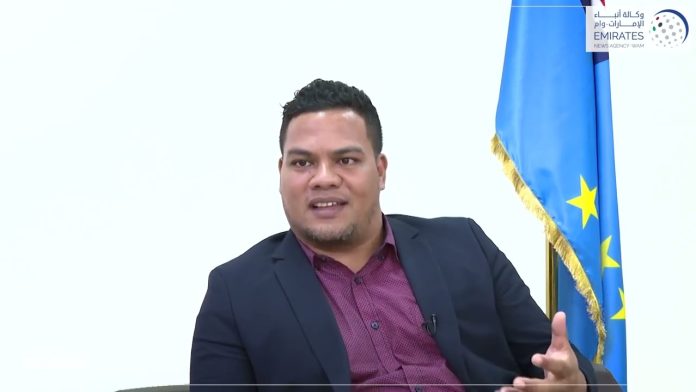Countries should cut down on their greenhouse gas emission and take greater responsibility for problems created by climate change to save island nations like Tuvalu from extinction, said the country’s senior official.
In an interview with the Emirates News Agency (WAM), Simon Kofe, Tuvalu’s Minister of Justice, Communication and Foreign Affairs, who is also a Nobel Peace Prize nominee for 2022 for his efforts in confronting climate change, said that Tuvalu is probably one of the first countries to go underwater if sea level continues to rise.
“The solution to our problem is that countries need to cut down on their greenhouse gas emissions. They need to take greater responsibility for the problem and the challenges that we are facing right now,” stressed Kofe.
Located in the Central Pacific Ocean, about 600 kilometres north of Fiji, Tuvalu is the fourth smallest country in the world, with a population of around 11,000 people. It comprises six coral atolls and three islands, covering an area of about 27 square kilometres.
“Tuvalu is facing the full brunt of climate change although we are the least contributor to the problem. Yet we are the ones that are facing extinction as a nation and as a people,” said Kofe, adding that countries should take action now to save not only island nations, but other countries too.
“If it doesn’t affect the big countries today, it will certainly affect them tomorrow. As a nation, we want to draw the line here and say if you save Tuvalu, you are saving the world.”
Among the effects of climate change in Tuvalu are coastal erosion, coral bleaching that affects the ecosystem of fisheries and saltwater intrusion into agricultural lands.
“Sometimes it’s difficult for people living in big cities and big countries to understand climate change, thinking that climate change is something that is far off. We want to bring the message that climate change is going to affect everyone,” Kofe said, adding that the world is already experiencing its effects with strong cyclones, earthquakes, and bushfires that are hitting different parts of the world.
Tuvalu, which may face extinction in the next 50 to 100 years from now if climate change continues to affect its existence, is looking for alternative solutions to preserve its identity.
The Future Now Project, which combines a series of activities developed and overseen through the Ministry of Justice, Communication and Foreign Affairs, will future proof Tuvalu against the most severe impacts of sea-level rise and climate change.
“We’re looking at saving our islands, reclaiming our land, building sea walls… But we are also preparing for a worst-case scenario, which is that maybe 50-100 years on the track, it will be very difficult to live in Tuvalu. Its population might have to relocate.
“So, the question is what do we do in that situation? Can we continue as a state without a physical land territory? Can we have voting rights? Can we have rights to our sovereign assets like DotTV and our oceans?” asked Kofe, who emphasised that one of the objectives of the Future Now Project is to have countries that establish relations with Tuvalu recognise that their state is permanent regardless of its physical territory.
For a small country like Tuvalu, whose main revenues come from selling fishing licenses and their country’s top-level domain name, DotTV, to international buyers, this is a legitimate concern.
“One of the approaches is looking at the legal avenues to be under international law to be able to safeguard that, to be able to say that once you are a state, you are a state forever regardless of the impacts of climate change.”
Tuvalu is pioneering in this appeal, according to Kofe, who said that when international laws and treaties were developed in the 70s and 80s, climate change was not an issue.
“Many of the international treaties are currently silent on climate change. That’s why there’s nothing in place to protect or accommodate the situation that Tuvalu is in right now. We’re hoping to do one step at a time by establishing bilateral relations and hopefully more countries come on board to recognise these principles.”
Indeed, Tuvalu is expanding its diplomatic presence to support its cause. Last week, it opened its latest embassy in Abu Dhabi, as a result of its participation in Expo 2020 Dubai.
“It is a big thing to have a mission here in the UAE,” said Kofe, whose country only has five embassies around the world.
2Our vision was to establish the relations here in the UAE, in this part of the world, given that the UAE is leading in innovation and technology,” said Kofe, stressing that his country is interested in the UAE’s expertise in building artificial islands and safeguarding them.
The Minister also hailed the UAE’s hosting of COP28, which he described as a perfect time to come up with solutions to the climate change problem.
During his visit to the UAE, Tuvalu’s Minister also signed a licensing agreement with GoDaddy, an American publicly traded Internet domain registrar and web hosting company, by which the latter will be able to manage the DotTV domain name for commercial purposes.
SOURCE: WAM/PACNEWS














